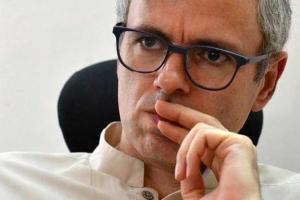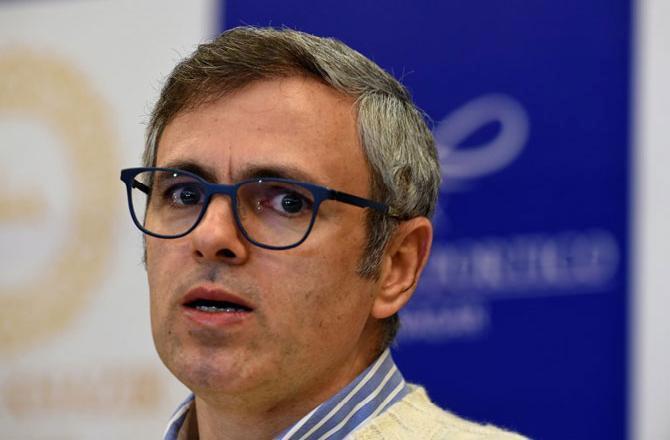Omar Abdullah, the 11th Chief Minister of Jammu and Kashmir, is an eminent politician belongs to a politically distinguished Kashmiri Muslim family. He is the youngest politician to become the union minister at the age of 29 and strived to find a solution to cross border terrorism in Jammu and Kashmir. The 48-year-old leader had also said that his belief of granting autonomy to Jammu and Kashmir would embolden the relationship between the state and India. We have traced Omar Abdullah's political journey in pictures. All pictures/ Facebook
Updated On: 2019-03-11 03:20 PM IST


Omar Abdullah was born March 10, 1970 to former Chief Minister of Jammu and Kashmir Farooq Abdullah and Mollie Abdullah, British by origin, in Rochford, Essex in the United Kingdom. He is the grandson of Sheikh Abdullah, popularly known as Sher-e-Kashmir.
Omar Abdullah did his schooling at the Burn Hall School in Srinagar and then Lawrence School, Sanawar in Himachal Pradesh. Later he went to Scotland to complete his higher studies. He did his bachelors in commerce from the University of Strathclyde. From the same university, he also completed his MBA.
In 1994, Omar Abdullah married Payal Nath and the couple had two sons Zamir and Zahir. The leader in 2011, announced that he and his wife were separated. He has a younger sister Sara Pilot, who is now married to Sachin Pilot, son of late Rajesh Pilot.
Omar Abdullah followed his father's footsteps by joining his political party National Conference, which was founded by Sheikh Abdullah in 1932. It is considered to be the first ever political party of Kashmir. Despite being born in a politically affluent family, Omar had his own share of struggles during his political career.
After joining National Conference, Omar contested and won the Lok Sabha election in 1998 from Srinagar constituency. At the time, National Conference was allied with the Bharatiya Janta Party. However, after 13 months, the BJP-led government was ousted by one vote in 1999. He had to step down from the post.
In the same year, re-election was held and Omar Abdullah once again became the Member of Parliament. He was appointed as the Union Minister of State for Commerce and Industry by the then NDA Government led by Atal Bihari Vajpayee. He was just 29 when he became the Union Minister, thus becoming the youngest politician to be elected as the union minister in the country till date.
Later in the year 2001, Omar Abdullah was appointed as Union Minister of State for External Affairs in the same government. However, in 2002, his party National Conference snapped ties with BJP following the 2002 Gujarat violence. Omar had to step down from the post as he protested against the alleged violence. In the same year, his father Farooq Abdullah passed on the party's baton to him and Omar became the president of the National Conference.
Though Omar began his political career at the centre quite successfully, his state-level political career began with a bad start. Omar contested Jammu and Kashmir elections and lost his seat to the rival party People’s Democratic Party (PDP). The party during the election had allied with Congress and other smaller parties in the state, forming a coalition government. However, Omar returned to Lok Sabha in the 2004 General Elections.
Omar Abdullah regained his constituency in 2008 state assembly elections with the support of Congress. He won 28 seats during the election and formed the new government in 2009. He was 38 when he won the election, thus making him the youngest Chief Minister of Jammu and Kashmir.
Following the victory at the state assembly election, Omar Abdullah resigned from the presidency of the JKNC and was replaced by his father. However, Omar had to face a lot of heat during his tenure as Chief Minister of Jammu and Kashmir.
Omar Abdullah had opposed the controversial Armed Forces Special Powers Act (AFSPA) that gives special powers to the Army. The act facilitated armed forces to excessive use of their power. He had repeatedly asked the centre to curb the excessive powers of armed forces. He repealed the AFSPA at the centre but all in vain.
Omar Abdullah continued to uphold the Abdullah family’s long-standing support for Jammu and Kashmir’s presence within the Indian union. He sought several ways to end the dispute between India and Pakistan regarding the Kashmir region. In accordance with the dispute, he met with Pervez Musharraf, then president of Pakistan, in 2006. Omar's step was perceived as the first meeting of its kind between a mainstream politician from Jammu and Kashmir and the Pakistani government. He thus showed that he committed to finding a solution of the Jammu & Kashmir cause. Thousands of Kashmiris organised a rousing reception when he returned from Pakistan.
Omar Abdullah became an internet sensation in 2008 when he gave a speech during the 2008 Lok Sabha vote of confidence. His rousing speech earned appreciation and won a lot of fans throughout the nation. This also helped him in winning the 2008 state assembly elections. National Conference won the maximum number of seats and formed a coalition government with the Congress.